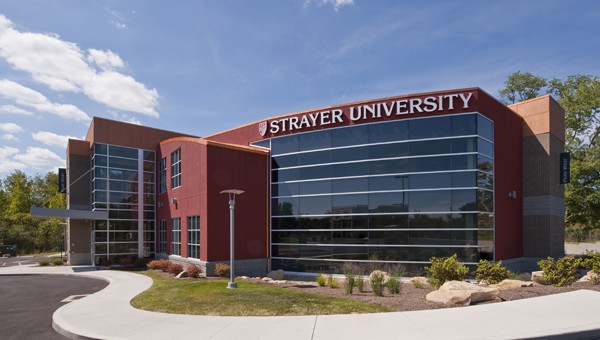IGEL Secure Endpoint OS
for Now and Next
IGEL is a transformative secure endpoint OS designed for SaaS, DaaS, VDI and secure browser environments. IGEL significantly reduces endpoint TCO and your endpoint attack surface.


The online education leader is leveraging the IGEL Universal Desktop Converter (UDC) and IGEL UD3 to provide faculty, administrators and student support staff with seamless and reliable access to their digital workspaces.
Scott Behrens, IT Operations Manager“Because there are very few or zero moving parts with the IGEL hardware, is very reliable. We’ve had only one failure out of more than 1,400 endpoints deployed since implementing IGEL more than two years ago. The German engineering is rock solid.”
As IT operations manager for Strayer University, Scott Behrens spent a lot of time looking at and evaluating endpoint computing solutions when it came to identifying a new way to provide the University’s faculty, administrators and student support staff with a seamless and reliable end user computing experience.
“I looked at various options including traditional desktops, but due to the dispersed nature of our business, I really wanted to find a solution that was both easy to manage and reasonably priced, especially for our remote locations where we have limited or no IT staff on premise,” said Behrens. “IGEL fit perfectly into this scenario. Because of IGEL’s simplicity, we are able to reduce the time it takes to get one of our locations up and running from a week, to a day, with little support and very little effort.”
With IGEL, Strayer University has been also been able to customize the services and applications on the endpoint. “We are deploying a solution that is exactly what each of my end users needs – all without the security holes or attack vectors that are typically present with traditional desktop computing solutions,” said Behrens. “With a typical Windows machine, there are a lot of services and processes that are keeping the machine up and running, but not necessary for what we are doing, which is connecting to a virtual desktop infrastructure. By allowing us to take out the parts of the operating system that weren’t required, IGEL allowed us to remove potential security holes associated with these services completely, and that’s something we really liked about the solution.”
Additionally, one of the IGEL capabilities that Behrens recently discovered and that he has started implementing at Strayer University are custom partitions. “We needed another way for our end-users to access Citrix XenDesktop in the event of an outage, such as a significant weather event,” said Behrens. “With IGEL partitioning, we are able to deploy Chrome as a local browser that is hidden from the end user. If we experience an outage, they are then able to still get to the Internet and access their digital workspace. This is one of the cool ways we are starting to leverage the Linux-based IGEL OS.”
Behrens added that one of the other reasons he chose IGEL was the low device failure rate. “Because there are very few or zero moving parts with the IGEL hardware, is very reliable. We’ve had only one failure in out of more than 1,400 endpoints deployed since implementing IGEL more than two years ago. The German engineering is rock solid,” he said.
Another benefit of the IGEL offering that really sold Strayer University on the solution was the ability to extend the life of its existing hardware through the IGEL Universal Desktop Converter (UDC). “We initially began our IGEL roll-out with the UDC, as we wanted to reduce capital expenditures initially by repurposing existing hardware,” said Behrens. “With IGEL, we expect to get more than seven more years out of the endpoints we are using to deliver Citrix XenDesktop to our end users. This will effectively help us double the industry standard for periodic replacement of these devices. The value and ROI are definitely there, and we are saving about 50% over that span of seven years.”
Behrens and his team at Strayer University has also been impressed by the IGEL’s knowledge and expertise, not just around its own products, but also virtualization, VDI and the Citrix ecosystem. “They know their products but they also have good knowledge around the integrations and interactions of their solutions with other virtualization and desktop delivery solutions,” said Behrens. “They never pass the buck like other companies we have work with, and we really appreciate that. From that start, that has led to a successful deployment and a true partnership between our two organizations.”
Behrens added, “I also think it is important to note that IGEL has always been ‘all in’ with Strayer, working with us to develop and update the products to make them better to meet our unique needs and requirements. Endpoint computing is their main line of business and that makes a huge difference for us. Their competitors are not as focused and often behind in innovation. Further, because this is a smaller part of their business, they aren’t able to allocate the same amount resources that IGEL does to meeting our needs.”
Strayer University first began its IGEL deployment in 2016, with a small pilot program of 30 users in the IGEL UDC. The university soon expanded its deployment, adding the IGEL UD3 and then Samsung All-in-One endpoints outfitted with the IGEL OS and IGEL Universal Management Suite (UMS). Strayer University’s IGEL deployment now includes more than 2,000 endpoints at 75 locations across the United States. The university plans to extend its deployment of the IGEL UD3s further as it grows and the need arises to replace aging desktop hardware.